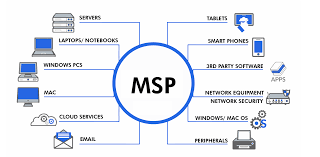In today’s fast-evolving digital world, businesses—small and large—are turning to technology for greater efficiency, scalability, and security. However, managing IT infrastructure in-house can be a significant burden, especially when resources are limited. This is where MSPs come in. Short for Managed Service Providers, MSPs offer professional IT services that help companies focus on core business tasks while leaving the technical complexities to experts.
What is an MSP?
An MSP (Managed Service Provider) is a third-party company that manages a business’s IT infrastructure and end-user systems on a proactive basis. Unlike traditional break-fix IT support, which only steps in when something goes wrong, MSPs take a preventative approach. They continuously monitor systems, resolve issues before they escalate, and ensure that IT operations run smoothly around the clock.
From cybersecurity and data backup to hardware support and software updates, MSPs offer comprehensive Managed IT Services tailored to meet specific business needs. Whether you’re a small business with minimal IT knowledge or a growing enterprise looking to scale efficiently, partnering with an MSP can be a game-changer.
The Rise in Demand for Managed IT Services
The increasing reliance on technology has made Managed IT Services a crucial component for modern businesses. Companies can no longer afford downtime, data breaches, or outdated systems. MSPs provide peace of mind by ensuring systems are up-to-date, secure, and fully optimized.
Benefits of Managed IT Services:
- Cost Efficiency: Reduces the cost of hiring full-time IT staff and expensive emergency repairs.
- 24/7 Support: Continuous monitoring and support for maximum uptime.
- Expertise On-Demand: Access to certified professionals with diverse skill sets.
- Security Compliance: Helps meet regulatory requirements like HIPAA, GDPR, and PCI-DSS.
MSPs also help businesses transition smoothly to digital environments through scalable services, offering a strategic advantage over competitors who rely on outdated IT setups.
Embracing Cloud Transformation
One of the key areas where MSPs shine is in the realm of Cloud Computing Solutions. The shift to the cloud has redefined how businesses store, manage, and access data. Cloud services enable flexibility, mobility, and scalability—features that are essential in today’s remote-first world.
MSPs and Cloud Computing Solutions
MSPs simplify cloud adoption by offering end-to-end Cloud Computing Solutions including:
- Cloud Migration: Seamless transfer of data, applications, and workflows to the cloud.
- Hybrid and Multi-Cloud Strategies: Tailored setups that combine on-premise and cloud-based systems.
- Data Backup and Recovery: Automatic cloud backups for uninterrupted business continuity.
- Virtual Infrastructure: Provisioning of servers, desktops, and storage in the cloud.
By leveraging cloud platforms like Microsoft Azure, Amazon Web Services (AWS), or Google Cloud, MSPs empower businesses to scale operations efficiently without managing physical servers.
Streamlining Collaboration with Microsoft 365
Modern workplaces depend on collaboration tools to maintain productivity and streamline communication. MSPs often include Microsoft 365 Solutions as part of their core offerings. Microsoft 365 is more than just Word and Excel—it’s a cloud-powered suite that includes Teams, SharePoint, OneDrive, Outlook, and other tools designed to enhance teamwork and mobility.
Key Features of Microsoft 365 Solutions
- Anywhere Access: Work from anywhere with cloud-hosted documents and apps.
- Real-Time Collaboration: Multiple users can edit documents simultaneously.
- Integrated Security: Built-in tools to protect against phishing, malware, and data loss.
- Automatic Updates: Stay current with the latest features and patches.
A skilled MSP can handle everything from Microsoft 365 setup and migration to licensing, compliance, and user training. This ensures that businesses make the most of their Microsoft 365 Solutions while staying secure and productive.
Industries That Benefit From MSP Services
MSPs serve a wide range of industries, each with unique challenges and compliance requirements. Here’s how MSPs support different sectors:
- Healthcare: Managing Electronic Health Records (EHRs) and HIPAA compliance.
- Legal: Securing sensitive legal documents and enabling remote case management.
- Finance: Ensuring PCI-DSS compliance and safeguarding financial transactions.
- Retail: Supporting POS systems, online storefronts, and customer data protection.
- Manufacturing: Streamlining operations with IoT and ERP system management.
In all these industries, MSPs help reduce risk, improve uptime, and foster innovation.
How to Choose the Right MSP
Not all MSPs are created equal. Choosing the right provider requires careful consideration. Here are the factors to look for:
- Experience and Track Record: Look for MSPs with a proven history of serving your industry.
- Certifications and Partnerships: Certifications from vendors like Microsoft, Cisco, or AWS indicate credibility.
- Security Practices: Ensure the MSP follows best practices in cybersecurity, data encryption, and compliance.
- Scalability: The ability to grow with your business is crucial.
- Transparent Pricing: Opt for providers with clear SLAs and predictable monthly costs.
A good MSP will act as a strategic partner, aligning your IT goals with your business objectives.
MSP Trends to Watch in 2025 and Beyond
As technology evolves, so do the services offered by MSPs. Some of the top trends reshaping the MSP landscape include:
- AI-Powered Automation: Predictive analytics for faster issue resolution.
- Zero Trust Security Models: Improved identity verification to combat cyber threats.
- Unified Communication Platforms: Integration of voice, chat, and video for seamless communication.
- Green IT Solutions: Sustainable tech practices to reduce energy consumption and e-waste.
By staying ahead of these trends, MSPs help clients maintain a competitive edge.
Final Thoughts
In an age where digital transformation is no longer optional, Managed Service Providers (MSPs) offer an indispensable solution for modern businesses. With access to Managed IT Services, advanced Cloud Computing Solutions, and productivity-enhancing Microsoft 365 Solutions, companies can operate more efficiently, reduce costs, and safeguard their operations against unexpected disruptions.
Whether you’re a startup or a growing enterprise, partnering with the right MSP ensures that your technology works for you—not the other way around. Embrace the future of IT management with a trusted MSP and unlock new levels of productivity, security, and innovation.
FAQs
1. What are Managed IT Services?
Managed IT Services refer to the proactive management and maintenance of a company’s IT infrastructure by a third-party provider, known as a Managed Service Provider (MSP). These services typically include 24/7 monitoring, cybersecurity, data backups, software updates, and help desk support. Businesses rely on Managed IT Services to reduce downtime, improve productivity, and ensure their technology operates smoothly.
2. How can Cloud Computing Solutions help my business?
Cloud Computing Solutions allow businesses to store, access, and manage data and applications over the internet instead of on physical servers. This enables greater flexibility, enhanced collaboration, and scalable resources. An MSP can assist with cloud migration, data backup, and cloud security to ensure a seamless transition and ongoing management of cloud services.
3. What is included in Microsoft 365 Solutions from an MSP?
MSPs offering Microsoft 365 Solutions typically handle setup, migration, licensing, and ongoing support for the full Microsoft 365 suite—Word, Excel, Teams, Outlook, OneDrive, and more. These solutions empower businesses with cloud-based collaboration tools while ensuring secure access and regular updates. MSPs also help customize the suite to match business needs.
4. Why should small businesses partner with an MSP?
Small businesses often lack the resources to build and manage a full in-house IT department. Partnering with an MSP gives them access to professional Managed IT Services, ensuring their technology remains secure, compliant, and operational without the high overhead. It’s a cost-effective way to gain enterprise-level IT support.
5. Are MSPs responsible for cybersecurity?
Yes, most MSPs provide robust cybersecurity services as part of their Managed IT Services. This can include firewalls, antivirus software, threat monitoring, vulnerability assessments, and data encryption. MSPs also offer employee training and compliance support to protect against phishing, ransomware, and other cyber threats.



































